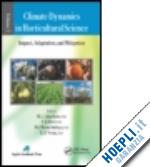M. L. Choudhary, PhD, is currently vice chancellor of Bihar Agricultural University in Sabour, Bhagalpur, Bihar, India. He received a master’s degree in horticulture from Banaras Hindu University, Varanasi, Utter Pradash, India, and his PhD in the USA. The government of India deputed him for an advanced study on Hi-Tech Horticulture and Precision Farming in Israel and Chile. In a career spanning 30 years, he has occupied several executive positions, including horticulture commissioner, Ministry of Agriculture, India; chairman, Coconut Development Board, Kochi (Kerala); Ministry of Agriculture, India; national project director, FAO; visiting scientist at Rutgers University, New Jersey, USA; head of the Department of Ornamental Crops, IIHR, Bangalore; and head of the Division in Floriculture at IARI, New Delhi. As horticulture commissioner of the Ministry of Agriculture, India, he conceived, conceptualized, and implemented flagship programs such as the National Horticulture Mission and the National Bamboo Mission and Micro-irrigation. Apart from his professional career, he was also chairman and member secretary of various committees constituted by the government of India as well as state governments. He has guided 18 PhD students and 21 MSc students in the field of horticulture and has published 124 book chapters, 19 books, and 109 research papers of national and international repute. Dr. Choudhary has represented India at various international forums in the capacity of chairman and member. He was also the chairman of the Codex Committee of the Scientific Committee for Organic Standard of Ministry of Commerce. He has been conferred with 15 awards from various scientific and nonscientific organizations and government committees for his outstanding contribution in the field of horticulture/floriculture. He has also been awarded the Fellowship of Horticultural Society of India. Dr. Choudhary in his 30 years of academic, research, and administrative career has visited more than 15 countries to participate in various professional meetings. V. B. Patel, PhD, is presently working as university professor and chairman at Bihar Agricultural University, Sabour, Bhagalpur, Bihar. He has worked on developing leaf nutrient guides, nutrient management strategies, use of AMF for biohardening and stress tolerance, and a survey of indigenous germplasm of fruit crops. He developed the Leaf Sampling Technique and Standards as well as made fertilizer recommendations for several fruits. He has developed nutrient management through organic means for high-density planted mango. He has guided three MSc and one PhD students. He earned his PhD from the Indian Agricultural Research Institute, New Delhi. Dr. Patel has organized eight national/international seminars and workshops as convener, associate convener, or core team member, including Indian Horticulture Congresses, the International Seminar on Precision Farming and Plasticulture, the National Seminar on Organic Farming, Seminar on Hitech Horticulture, and National Seminar on Climate Change and Indian Horticulture. Dr. Patel has received a number of national awards and recognitions for his work in the field of horticultural research and development, including being named a Fellow of The Horticultural Society of India, New Delhi; Associate, National Academy of Agricultural Sciences (NAAS), New Delhi, India; Agricultural Leadership Award (2012) by Agricultural Today, Centre for Agricultural and Rural Development, New Delhi; Hari Om Ashram Trust Award (2007); Lal Bahadur Shastri Young Scientist Award, ICAR, New Delhi (2009); Young Scientist Award, NAAS (2005-06); Yuva Vigyanic Samman from Council of Science and Technology, Govt. Uttar Pradesh (2005); and AAAS Junior Award (2005) from the Indian Society for Plant Physiology, New Delhi. He has also received Best Research Paper/Poster paper presentation awards from different organizations. He has published 41 research papers, 16 books and bulletins, and many popular articles, among other publications. Dr. Mohammed Wasim Siddiqui is an assistant professor/scientist in the Department of Food Science and Technology, Bihar Agricultural University, India, and author or co-author of 21 peer-reviewed journal papers, 12 book chapters, and 16 conference papers. Recently, Dr. Siddiqui has initiated an international peer-reviewed journal, Journal of Postharvest Technology. He has been serving as an editorial board member of several journals. Dr. Siddiqui acquired a BSc (agriculture) from Jawaharlal Nehru Krishi Vishwavidyalaya, India. He received MSc (horticulture) and PhD (horticulture) from Bidhan Chandra Krishi Viswavidyalaya, Mohanpur, Nadia, India, with specialization in postharvest technology. He was awarded the Maulana Azad National Fellowship Award from the University Grants Commission, New Delhi, India. He has received several grants from various funding agencies to carry out his research works during his academic career. S. Sheraz Mahdi,











